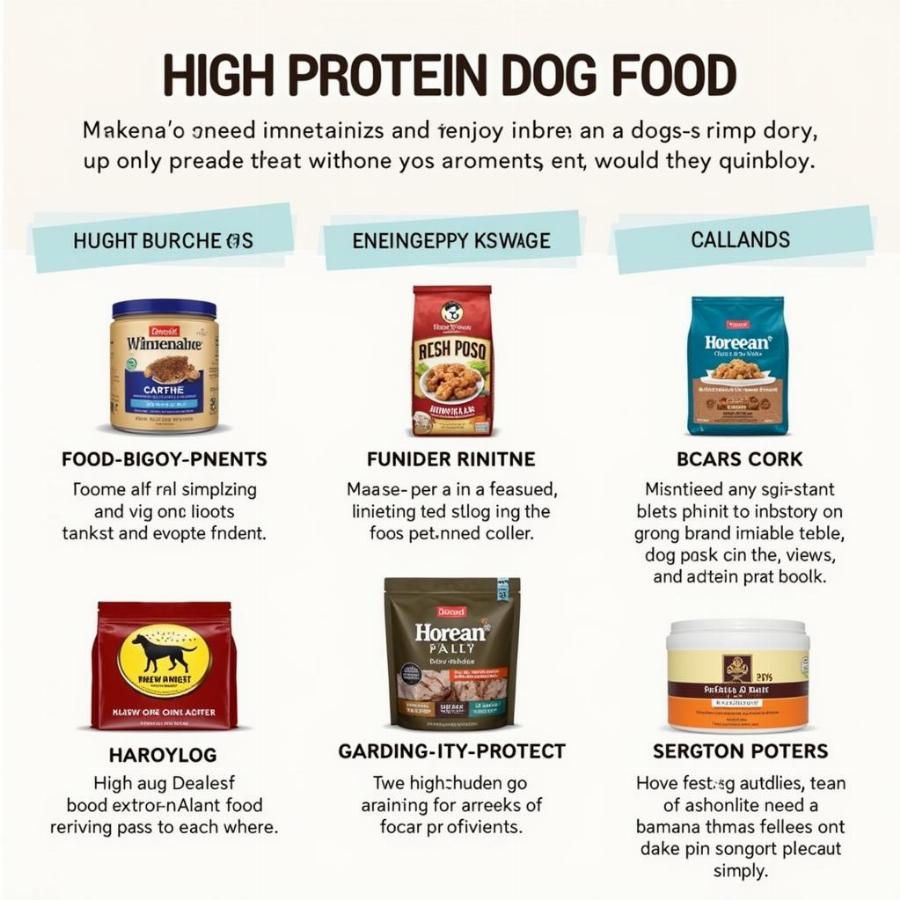Choosing the right dog food can feel overwhelming, especially with so many options claiming various benefits. If you’re looking for dog food high in protein, you’re on the right track to ensuring your furry friend gets the nutrients they need for a healthy and energetic life. High-protein diets can benefit dogs of all ages and breeds, from active puppies to senior companions. Let’s dive into why protein is so crucial and what to look for when selecting a high-protein dog food.
Why is Protein Important for Dogs?
Protein is a fundamental building block for dogs, just as it is for humans. It’s essential for building and repairing tissues, supporting muscle growth, maintaining a healthy coat and skin, and boosting their immune system. Without enough protein, dogs can experience a range of health problems, including muscle loss, weakened immunity, and a dull, dry coat.
What are the Benefits of High-Protein Dog Food?
Growth and Development: Puppies and young dogs need a higher percentage of protein to support their rapid growth and development. High-protein dog food helps them build strong bones, muscles, and organs.
Weight Management: Surprisingly, high-protein diets can also assist with weight management. Protein helps dogs feel fuller for longer, reducing their tendency to overeat. It also helps maintain lean muscle mass, which is essential for burning calories.
Increased Energy Levels: Protein provides a sustained source of energy, keeping your dog active and playful throughout the day. This is particularly important for working dogs, sporting breeds, or simply energetic pups who love to run and play.
Improved Coat and Skin Health: Protein is crucial for healthy skin and a shiny coat. A high-protein diet can help prevent skin problems and promote a luxurious, healthy-looking coat.
Enhanced Immune Function: Protein plays a vital role in supporting a healthy immune system, helping your dog fight off infections and stay healthy.
How Much Protein Does My Dog Need?
The ideal protein level for your dog depends on several factors, including their age, breed, activity level, and overall health. Generally, adult dogs require a minimum of 18% protein in their diet, while puppies and highly active dogs may need up to 30% or more. Always consult with your veterinarian to determine the optimal protein intake for your specific dog.
What to Look for in High-Protein Dog Food
Quality Protein Sources: Look for dog foods that list specific meat sources, such as chicken, beef, lamb, or fish, as the primary ingredients. Avoid generic terms like “meat by-products” or “animal meal.” If you’re looking for more information on high-protein dog foods, check out our article on high protein dog foods.
Balanced Nutrition: While protein is crucial, ensure the dog food also provides a balanced blend of essential nutrients, including fats, carbohydrates, vitamins, and minerals. You might find our article on retriever high protein dog food helpful if you own a retriever.
Digestibility: High-quality protein sources are more easily digested, ensuring your dog absorbs the nutrients they need. Look for dog foods with high digestibility scores.
Life Stage: Choose a formula specifically designed for your dog’s life stage (puppy, adult, or senior) to ensure their nutritional needs are met. For example, pedigree high protein dog food offers different formulas for different life stages.
 Selecting the Right High-Protein Dog Food
Selecting the Right High-Protein Dog Food
What are Some Affordable High-Protein Options?
Many dog owners are concerned about the cost of high-quality dog food. Fortunately, several cheap high protein dog food options are available without compromising on quality. These affordable choices can provide your dog with the protein they need without breaking your budget.
Is High-Protein Dog Food Right for All Dogs?
While most dogs thrive on a high-protein diet, some dogs with specific health conditions, such as kidney disease, may need to limit their protein intake. Always consult your veterinarian before switching your dog to a high-protein diet, especially if they have any underlying health concerns. They can offer personalized advice based on your dog’s individual needs. For a specific product review, you might be interested in our nutrisource outback trails dog food review.
Conclusion
Choosing dog food high in protein can significantly impact your dog’s overall health and well-being. By understanding the benefits of protein and selecting a high-quality dog food, you can provide your canine companion with the nutrients they need to thrive. Always consult with your veterinarian to determine the best dietary approach for your dog’s specific needs.
FAQ
- Can too much protein be harmful to my dog? While rare, excessive protein can strain the kidneys in dogs with pre-existing kidney conditions. Consult your vet.
- What are some signs of protein deficiency in dogs? Signs can include muscle loss, weight loss, a dull coat, and decreased energy levels.
- Are grain-free high-protein diets good for all dogs? Not necessarily. Some dogs may have sensitivities to ingredients in grain-free formulas. Consult your vet.
- How can I transition my dog to a new high-protein food? Gradually mix the new food with the old food over several days to avoid digestive upset.
- What if my dog doesn’t like high-protein food? Try different brands or flavors until you find one your dog enjoys.
Beaut Dogs is your one-stop shop for all things related to your beloved canine companion. We provide expert advice and resources to help you navigate the wonderful world of dog ownership. From breed information to health tips, we’re here to support you every step of the way. For personalized guidance and answers to your specific questions, feel free to reach out to us at [email protected]. We’re happy to help! Visit us at https://beautdogs.com for more information.